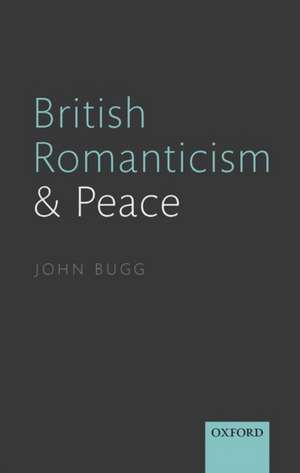British Romanticism and Peace
Autor John Buggen Limba Engleză Hardback – 10 feb 2022
Preț: 472.34 lei
Preț vechi: 654.09 lei
-28% Nou
Puncte Express: 709
Preț estimativ în valută:
90.38€ • 94.56$ • 75.08£
90.38€ • 94.56$ • 75.08£
Carte disponibilă
Livrare economică 01-07 martie
Preluare comenzi: 021 569.72.76
Specificații
ISBN-13: 9780198839668
ISBN-10: 0198839669
Pagini: 230
Ilustrații: 10 Illustrations
Dimensiuni: 146 x 222 x 20 mm
Greutate: 0.43 kg
Editura: OUP OXFORD
Colecția OUP Oxford
Locul publicării:Oxford, United Kingdom
ISBN-10: 0198839669
Pagini: 230
Ilustrații: 10 Illustrations
Dimensiuni: 146 x 222 x 20 mm
Greutate: 0.43 kg
Editura: OUP OXFORD
Colecția OUP Oxford
Locul publicării:Oxford, United Kingdom
Recenzii
Bugg situates his analysis in a rich interdisciplinary archive of writing.
This study insists on the human potential for peace. It places current scholarship in peace studies in conversation with the rich and complex discourse on peace in Britain from the end of the American War of Independence through the aftermath of Waterloo. The book calls its readers to treat peace not as the mere cessation of war but as an active pursuit and positive presence.
John Bugg's British Romanticism and Peace demands a shift of emphasis and attention, warning of the dangers of acceding to war's dominion...British Romanticism and Peace, where the achievement of peace awakens and reawakens the reader to the need for resistance, struggle, and work. And for good reason.
Bugg underscores what he considers the anachronistic danger of projecting modern assumptions about the inevitability of war onto the early nineteenth century. This is not simply a matter of historical precision, but also of human capacity and hope. Bugg makes a persuasive and moving case that peace is not merely a gap between battles, but a positive condition, indeed the foundation of a just society.
Bugg's book, Romanticism and Peace, is such a book. It's not that the reader doesn't already know that the period has moments of peace as well as the well-known conflicts of the American Revolution and the Napoleonic wars; it's that one will almost immediately feel, upon beginning to read Bugg's book, that one has been looking the wrong-side up at the events of the time. One begins to wonder why one has ignored the outbreaks of peace that happened throughout the period and the effects those moments of peace had upon the literature of the time.
This study insists on the human potential for peace. It places current scholarship in peace studies in conversation with the rich and complex discourse on peace in Britain from the end of the American War of Independence through the aftermath of Waterloo. The book calls its readers to treat peace not as the mere cessation of war but as an active pursuit and positive presence.
John Bugg's British Romanticism and Peace demands a shift of emphasis and attention, warning of the dangers of acceding to war's dominion...British Romanticism and Peace, where the achievement of peace awakens and reawakens the reader to the need for resistance, struggle, and work. And for good reason.
Bugg underscores what he considers the anachronistic danger of projecting modern assumptions about the inevitability of war onto the early nineteenth century. This is not simply a matter of historical precision, but also of human capacity and hope. Bugg makes a persuasive and moving case that peace is not merely a gap between battles, but a positive condition, indeed the foundation of a just society.
Bugg's book, Romanticism and Peace, is such a book. It's not that the reader doesn't already know that the period has moments of peace as well as the well-known conflicts of the American Revolution and the Napoleonic wars; it's that one will almost immediately feel, upon beginning to read Bugg's book, that one has been looking the wrong-side up at the events of the time. One begins to wonder why one has ignored the outbreaks of peace that happened throughout the period and the effects those moments of peace had upon the literature of the time.
Notă biografică
John Bugg is Professor of English at Fordham University in New York City. He is the author of Five Long Winters: The Trials of British Romanticism (Stanford University Press, 2013), and editor of The Joseph Johnson Letterbook (Oxford University Press, 2016) and the Oxford World's Classics edition of Wuthering Heights by Emily Brontë (2020). His essays and reviews have appeared in PMLA, ELH, TLS, Studies in Romanticism, and several other journals.
